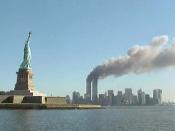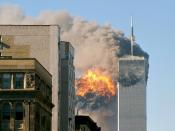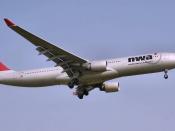Will We Ever Recover?
What does 911 mean to you? For some it is just a number dialed when there is an emergency but to others it is a day of death, triumph, and tribulations. September 11, 2001
(referred to as 9/11), a day that changed our way of life. The events that occurred on September 11, 2001 was "...the deadliest act of terrorism in the United States..." (September 11, 2001 Terrorist Attack).
Tuesday, September 11, 2001:
8:46AM: American Airlines flight 11, flown by
hijackers, crashes into the north side of
the northern tower of the World Trade
Center, which later collapses.
9:02AM: United Airlines flight 175, flown by
hijackers, crashes into the south
side of the southern tower, which later
collapses.
9:37AM: American Airlines flight 77, flown by
hijackers, crashes into the western side of
the Pentagon.
10:03AM: United Airlines flight 93, flown by
hijackers, crashes southeast of Pittsburgh
in Somerset county, Pennsylvania.
In one day, thousands of lives, 4 airplanes, at least 4 buildings, and life, as we knew it, was lost. Not only did 9/11 cause tremendous pain to people in the US it also caused a hit in the economy that continues to attack the country, one major hit being the airline industry.
The effects of 9/11 immediately hindered the airline industries. Industry experts predicted that the demand for air travel would fall due to safety concerns after the attacks. As soon as the day after, Wednesday, Midway Air said it is ceasing operations immediately in order to preserve the company's value, in anticipation of a sharp drop in air travel. They also announced that 1,700 employees would be terminated effective immediately. Midway Air was the first airline to announce its troubles but was certainly not the last; there were many to follow.
Continental, "The nation's No. 5 airline" was the first major carrier to announce a layoff. "Continental Airlines announced Saturday that it is cutting its schedule of flights by 20 percent and laying off 12,000 employees due to the reluctance of both business and leisure travelers to return to the skies after Tuesday's terrorist attack on the United States" (Continental slashes staff). It was a known fact by this point that all airlines were in trouble and were in need of federal assistance if they were going to survive. Continental, not the first, yet still was not the last airline to announce its troubles. This same day, Saturday, Northwest Airlines also announced a 20 percent cut in its flight schedule and would be looking in to a possible layoff to accommodate the flight reduction.
One week after the tragic events several major airlines were on the verge of financial destruction. Screaming for federal assistance, it was expected that large layoffs were still likely even with this assistance. Leo Mullin, CEO of Delta Air Lines, said, "At least three of our major members are on the brink in respect to their financial situations. The industry lost an estimated $1.4 billion from Tuesday through Friday last week, and expect to lose another $3.4 billion through the end of the month. Help is needed by the end of the week for some carriers to survive."
The largest airline firm and the UAL unit join the growing list of carriers lying off their employees. AMR Corporation, owner of both American Airlines and Trans World Airlines, as well as their rival, United, announce staff reductions of 20,000 employees. "AMR said the reduction is due to the 20 percent cut in its schedule for the foreseeable future in the wake of last week's terrorist attacks. Two American Airline jets were hijacked and
crashed into the World Trade Center and the Pentagon, resulting in a shutdown of the total U.S. air transportation system for two days and a sharp drop in new ticket purchases by the public" (AMR, United each cut 20K). In an effort to explain this cut to the employees,
Donald Carty, CEO of AMR, expressed the following statement in a letter, "I have declared a state of emergency at American Airlines. This declaration is an official recognition that ? hard as it may be to accept ? our company's very survival depends on dramatic change to our
operations, our schedule, and worst of all our staffing levels."
One week and one day pass; with the confirmed layoffs already at 51,000, it was believed that the number could double as other airlines cut staff to deal with the cuts in the flight schedules. Sad to say, this expectation was right. Not including several major airlines, such as Delta Air Lines and Northwest Airlines the layoff totals were up to 90,000. Both Delta Air Lines and Northwest Airlines were expecting a 20 percent cut in their staff, and with a total of 135,000 employees between the two of them, a 20 percent cut would add an extra 27,000 layoffs.
The trickling effect from the terrorist attack to the airlines having to cut flight schedules also had an effect on yet another company. Boeing, an aircraft manufacturer, also felt the retributions of this attack. With the decrease in flights, travelers, and profits, there was a decrease in orders for additional aircraft to be produced, and with this decrease in orders came a decrease in personnel needed, in other words, more layoffs. Boeing employing about 199,000 workers expected to layoff 20,000 to 30,000 by the end of 2002. "The (Boeing) Company said it will lay off workers in its commercial jet unit by the end of 2002 as a result of dwindling orders in the wake of the terrorist attack against the United States" (Boeing to cut 20-30K). In 2001, Boeing expected to deliver 538 aircraft, which after the attack, they thought could decline to 500. For 2002, they estimated the aircraft delivery to be in the low 400s, compared with the previous estimate of 510 to 520.
It is pretty evident that every airline was deeply affected by this attack. Some airlines were forced in to bankruptcy, the rest, having to cut at least 20 percent of their flights as well as their personnel, were left in need of federal assistance. Did this federal assistance come?
Yes, but to some airlines it was not enough. "The federal government showered $5 billion in cash and offers of $10 billion in loan guarantees to prop up the struggling industry. The measures have done little to help" (Ramstack).
The nation's major airlines are measuring success by their ability to avoid bankruptcy a year after 9/11. US Airways is in bankruptcy. American is restructuring and still cutting jobs to avoid bankruptcy. United Airlines will file for bankruptcy unless it can drastically reduce costs. Passenger frequency is still around 10 percent lower than before the attack. "But now, White House economists are taking a 'let it be' stance, to let the weaker airlines fail, leading to restructuring of the industry. The federal government will consider picking up
the pieces afterward" (Ramstack). Andrew H. Card Jr., White House chief of staff and a former transportation secretary, said, "I do not think there is a need for any significant bailout until we understand what the fallout is from the restructuring that is taking place inside companies and inside the industry." "Congress, which returns this week from its August recess, instead will focus on airline security, such as stronger cockpit doors, bomb detection and debate on whether pilots should carry guns" (Ramstack). A year and a half has gone by and we are still feeling the effects of the unthinkable terrorist attacks that occurred on September 11, 2001.
References
AMR, United each cut 20K. CNN.com. September 2001.
http://edition.cnn.com/2001/Business/09/19/Airline.layoffs/index.html.
Boeing to cut 20-30K. CNN.com. September 2001.
http://www.cnn.com/2001/US/09/18/gen.Boeing.layoffs/index.html.
Continental slashes staff. CNN.com. September 2001.
http://www.cnn.com/2001/US/09/15/Continental.slashes/index.html.
Ramstack, Tom. Airline Industry Waits for Takeoff. The Washington Times. September, 2002. http://www.washtimes.com/business/20020902-2616520.htm.
September 11, 2001 Terrorist Attack. Wikipedia. November 2001.
http://www.wikipedia.org/wiki/September_11_Terrorist _Attack.



Nice
Good quotes and sources to back up your main point. The facts are weaved nicely into the essay.
2 out of 2 people found this comment useful.